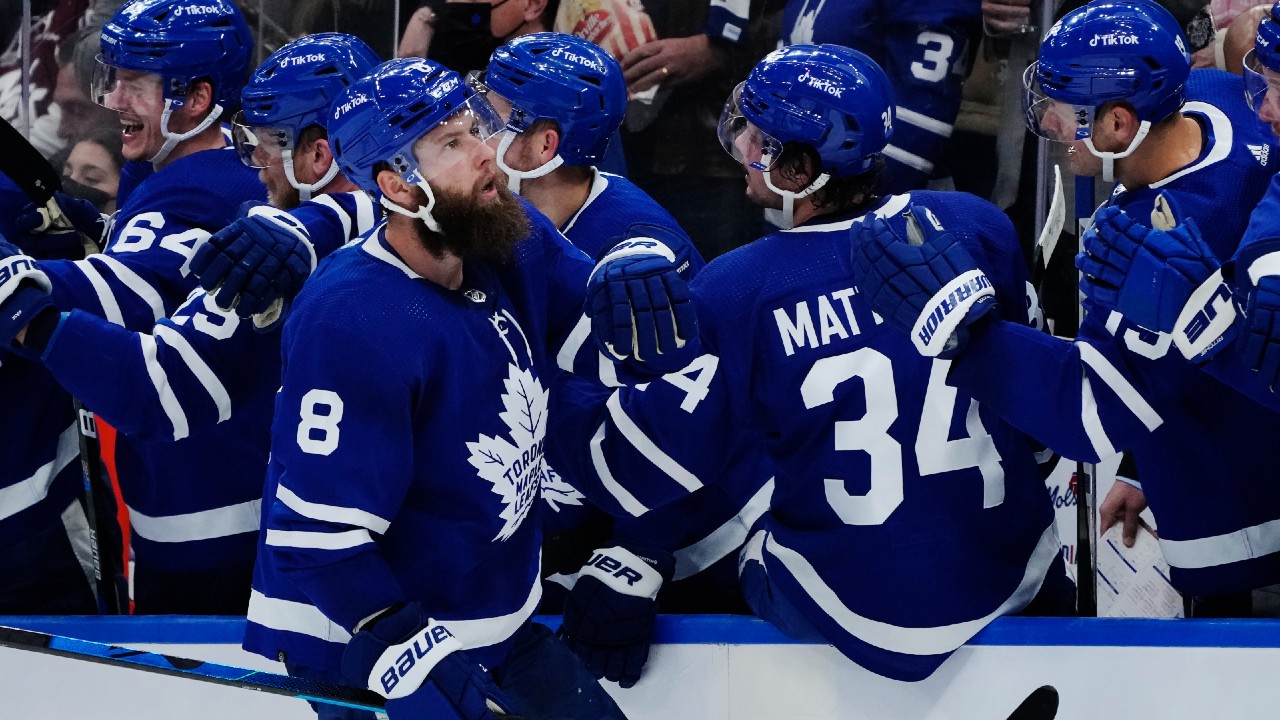
TORONTO – “Sometimes the stars align for you.”
That is how general manager Julien BriseBois explained how his Hart Trophy–winning game-breaker Nikita Kucherov was too sore from hip surgery to play for the salary-cap-strapped Tampa Bay Lightning in the 2020-21 regular season. Yet Kucherov was healthy enough to skate nearly 20 minutes, score two goals and add an assist in Game 1 of the playoffs.
Milking but not breaking long-term injury guidelines of the collective bargaining agreement, BriseBois, Kucherov and the Bolts barged through four rounds and hoisted a second chalice carrying a collective “cap hit” of $98.84 million. We put “cap hit” in quotes because, come postseason, the NHL’s salary cap is irrelevant.
Thems the rules.
And so, when Kucherov is in one (a bender) and on one (a boat) last summer, and he’s photographed with a T-shirt emblazoned with an image of himself hugging a Bud Light alongside the phrase “$18M OVER THE CAP,” some got indignant and some got an idea.
The first time the stars aligned was in 2015.
Patrick Kane’s damaged collarbone took him out of the Chicago Blackhawks’ lineup and off their books ahead of the trade deadline. Then GM Stan Bowman added Antoine Vermette ($3.5 million), Kimmo Timonen ($2.75 million) and Andrew Desjardins ($800,000), spending the precise cost of Kane’s LTIR relief.
Kane rehabbed the remainder of the regular season, then played more than 23 minutes and set up a pair of goals when he jumped back into action in Game 1 of the playoffs. The spendy Blackhawks won the Stanley Cup.
In wake of the Kane incident, the league’s decision-makers discussed the cap loophole.
“It seems to be a counterbalance that you work 82 nights with one financial equation, then on Game 1, there are no financial concerns,” Blues GM Doug Armstrong said in 2016. “I’m not sure what the proper answer is.”
Because this bad-luck-turned-good-fortune formula has worked in the past, eyebrows now raise whenever a contender slides a star player on LTIR ahead of the deadline.
The Vegas Golden Knights were staring at a forced trade off their roster until Mark Stone (back) went on the shelf, clearing enough room for No. 1 centre to pop onto a Cup-hungry roster.
Though no one doubts Stone’s back is in a bad way — and the NHL will investigate potentially shady behaviour — how shocked would fans be if Stone’s injury healed well enough by May?
Today’s hockey fan is as smart as it is suspicious.
Conspiracies float.
So, it is against this backdrop that defenceman Jake Muzzin (concussion) and his $5.625 million was shifted to the Toronto Maple Leafs’ long-term injured reserve Wednesday evening.
As long as Muzzin is off the roster, the Maple Leafs are free to use roughly $5.624 on other players, be it call-ups, new signings or trade acquisitions.
If and when a healthy Muzzin returns to the roster in the regular season, Toronto must be cap compliant.
“I want to take as much time as we possibly have, to find out what exactly it is we need. I know I have my opinions, and they change all the time. I’m sure everyone here has them as well. And teams around the league probably have their opinions of us when they look at it,” Leafs GM Kyle Dubas said recently of his deadline strategy.
“We’re in that mode now where we’re trying to win.”
Regardless of Muzzin’s health, for the right deal, prospects (Nick Robertson? Nicholas Abruzzese? Roni Hirvonen?), draft picks (2022 first-rounder?), and players (Justin Holl? Travis Dermott? Alexander Kerfoot?) could all be in play.
A true top-four defenceman (no disrespect, Ilya Lyubushkin) and a top-six forward would be at the top of the wish list.
But what should not be lost in the math and forthcoming trade rumours — Forget Luke Schenn and Tyler Motte. Let’s go get J.T. Miller, Claude Giroux, Filip Forsberg, Ben Chiarot and Jakob Chychrun!—is a career and quality of life that could be in jeopardy here.
Muzzin is a Stanley Cup champion, yes.
More importantly, Muzzin is a son, to Ed and Judy; a husband, to Courtney; and father of a girl named Luna, who will celebrate her third birthday right before Game 1 this spring.
“The head’s no joke,” close friend Mitch Marner said. “We got to make sure that when he comes back, he’s fully ready to go.
“We don’t need anything hurting him in the future or even past hockey. He’s got a family and kids. There’s more important things than trying to battle through stuff like that.”
Felled in a frightening and accidental collision with Chris Wideman Monday in Montreal, Muzzin suffered his second concussion in a span of 37 days. He spent the night of his 33rd birthday undergoing tests at a Montreal hospital.
In the six games he played in between concussions, the Leafs’ top shutdown man went minus-6 and confessed to tentativeness — kryptonite to his hardnosed style of game.
“It was tough coming back a little bit,” Muzzin said last week. “You’re a little hesitant maybe, but I feel more comfortable now.
“I have to be physical or else I’m not as effective.”
Head injuries are unique and mysterious. There are plenty of unknowns here.
The deadline is still 25 days away. More injuries could occur. Muzzin could rebound. The trade landscape will shift.
What we can feel confident is saying, though, is two things:
1. If Dubas has money to spend, he’ll spend it.
2. And if Muzzin feels healthy and confident stepping back on the ice, he will.
“The one thing about Jake Muzzin is,” Dubas said recently, “especially when people start to count him out, or people think that he looks like he’s starting to fade, he’s very competitive, and he has a lot of pride, and he’s able to find his way back.”








